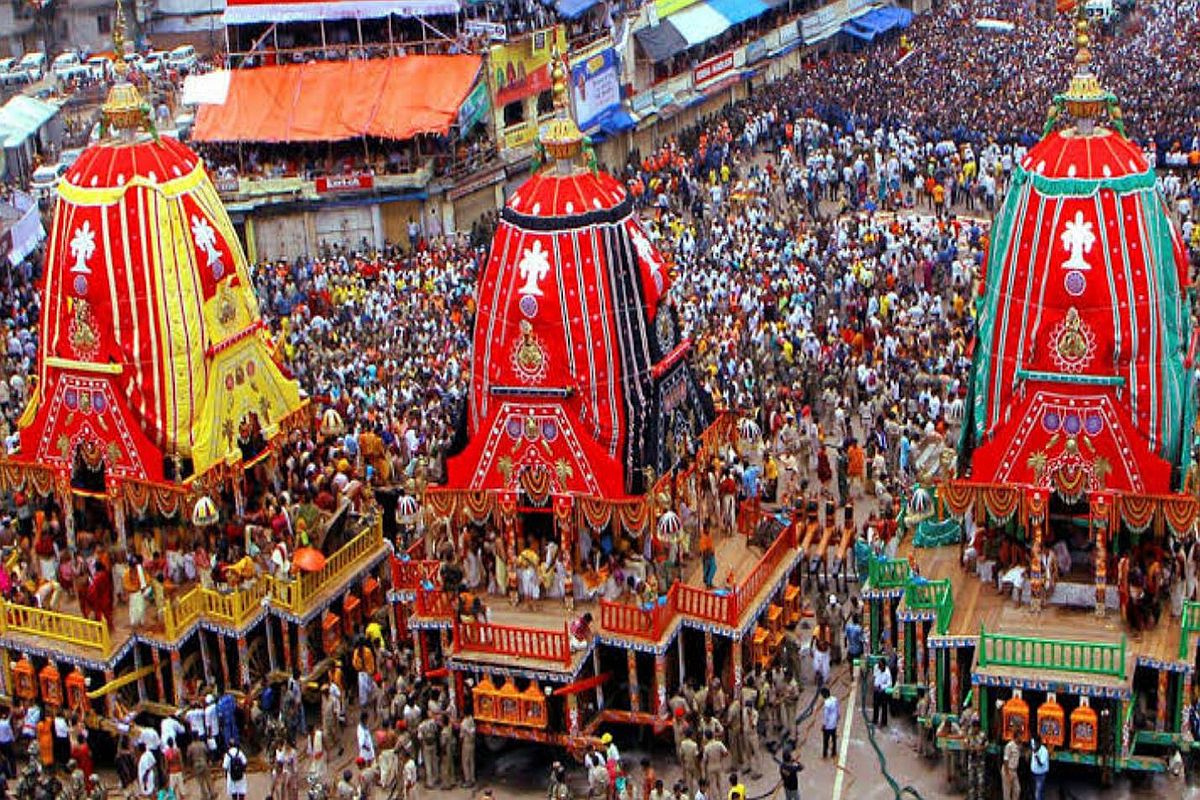The famous ‘Rath Yatra’ of Lord Jagannath and his siblings began at Odisha’s Puri on Tuesday morning but devoid of devotees in a historic first.
Only priests and temple attendants gathered at the Jagannath Temple, a day after the Supreme Court granted the state to hold the annual chariot festival this year despite the Coronavirus pandemic.
Advertisement
As per the top court order, no more than 500 people are allowed to pull the chariots. They are permitted to do that only if they have tested negative for Coronavirus. This number includes temple servitors and police personnel.
Earlier today, the temple premises were sanitised and the priests performed the “Mangala Aarti” early in the morning.
Amid blowing of conches and beating of cymbals, the ceremonial procession of the deities known as “Pahandi” – carrying the deities on chariots out of the temple — took place.
The three deities were taken atop of the three traditionally decked up wooden chariots — Nandighosa (for Jagannath), Taladhwaja (for Balabhadra) and Devadalana (for Subhadra).
The chariots will be pulled to Gundicha temple in Puri, which is around 3 km away from the main Jagannath temple.
Puri district collector Balwant Singh said, “All are cooperating for the smooth functioning of Rath Yatra as per the Supreme Court order. I request all devotees to stay at home and watch the live telecast of the festival”.
The festival marks the annual journey of the three deities — Lord Jagannath, his brother Balabhadra and sister Subhadra — from the 12th century Jagannath temple to the Gundicha temple.
The festival ends after nine days when the deities make their way back to the Jagannath temple.
Following the Supreme Court direction, a partial curfew has been imposed in Puri and all the entry points to the town have been sealed since last night. No one would be allowed to come to the grand road.
Meanwhile, Prime Minister Narendra Modi earlier today extended his greetings to the people of the country on the auspicious occasion of Lord Jagannath’s Rath Yatra.
On Monday, the Supreme Court allowed the ‘Rath Yatra’ to be conducted in Odisha’s Puri amidst the Coronavirus pandemic, but with certain restrictions.
The apex court allowed the Odisha government and Jagannath Temple trust to decide on conducting the annual ‘rath yatra’ and said that the state can even stop the yatra or festivities if they feel it is going out of hand.
Meanwhile, the court also made it clear that it is only considering conducting the yatra in Puri and not anywhere else in Odisha.
The Centre and the state had told the top court that the festival can be held without public participation.
“It is a matter of faith for crores. If Lord Jagannath will not come out tomorrow, he cannot come out for 12 years as per traditions,” Solicitor General Tushar Mehta, who represented the Centre, told the Supreme Court.
“While maintaining the precautions to ensure that the pandemic is not spread further, the state government can impose curfew for a day.”
He emphasized that all sevayats and pandas who are tested negative for Coronavirus can participate in rituals as may be decided by Shankracharya.
On June 18, a bench headed by Chief Justice SA Bobde and Justices Dinesh Maheshwari and AS Bopanna had disallowed the ‘Rath Yatra’ this year saying “Lord Jagannath will not forgive us if we allowed the rath yatra”.
The apex court further said that such gatherings cannot take place at a time of the pandemic. It also referred to the advice by health professionals to maintain social distancing as the deadly virus can spread via respiratory droplets and surface contact.











